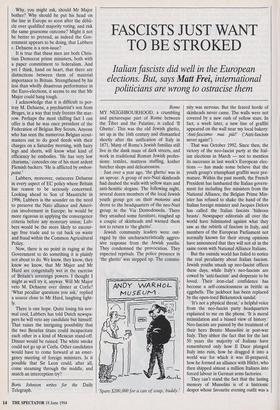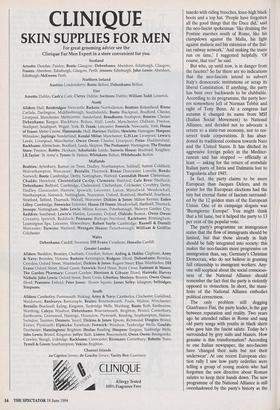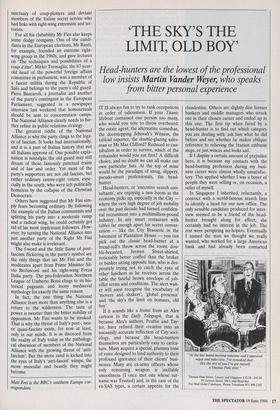FASCISTS JUST WANT TO BE STROKED
Italian fascists did well in the European politicians are wrong to ostracise them
Rome MY NEIGHBOURHOOD, a crumbling and picturesque part of Rome between the Tiber and the Palatine, is called 'II Ghetto'. This was the old Jewish ghetto, set up in the 16th century and dismantled shortly after the unification of Italy in 1871. Many of Rome's Jewish families still live in the dank maze of dark streets, and work in traditional Roman Jewish profes- sions: textiles, mattress stuffing, kosher butcher shops and delicatessens.
Just over a year ago, 'the ghetto' was in an uproar. A group of neo-Nazi skinheads had daubed the walls with yellow stars and anti-Semitic slogans. The following night, several dozen members of the local Jewish youth group got on their motorini and drove to the headquarters of the neo-Nazi group in the Via Domodossola. There they smashed some furniture, roughed up a couple of skinheads and warned them not to return to 'the ghetto'.
Jewish community leaders were out- raged by this uncharacteristically aggres- sive response from the Jewish youths. They condemned the provocation. They expected reprisals. The police presence in `the ghetto' was stepped up. The commu- 'Spare $200,000 for a can of soup, buddy.' nity was nervous. But the feared horde of skinheads never came. The walls were not covered by a new rash of yellow stars. In fact, a week later, a new line of graffiti appeared on the wall near my local bakery: `Anti-fascism° mai pia!' (Anti-fascism never again!') That was October 1992. Since then, the victory of the neo-fascist party at the Ital- ian elections in March — not to mention its successes in last week's European elec- tions — has made some believe that the youth group's triumphant graffiti were pre- mature. Within the past month, the French President has lambasted the Italian govern- ment for including five ministers from the National Alliance, the Belgian Prime Min- ister has refused to shake the hand of the Italian foreign minister and Jacques Delors has called the Italian fascists 'hideous beasts'. Newspaper editorials all over the world have fulminated against what they saw as the rebirth of fascism in Italy, and members of the European Parliament not normally known for their strong opinions have announced that they will not sit in the same room with National Alliance Italians.
But the outside world has failed to notice the real peculiarity about Italian fascism. Jewish youths smash up neo-fascist offices these days, while Italy's neo-fascists are cowed by 'anti-fascism' and desperate to be loved. Their iron-clad confidence has become a self-consciousness as brittle as eggshells. The jackboot has been replaced by the open-toed Birkenstock sandal.
`It's not a physical threat,' a helpful voice from the neo-fascist party headquarters explained to me on the phone. 'It is moral intimidation and a biased view of history.' Neo-fascists are pained by the treatment of their hero Benito Mussolini in post-war Italy. They abhor the fact that for the last 50 years the majority of Italians have remembered only how Il Duce plunged Italy into ruin, how he dragged it into a world war for which it was ill-prepared, how he formed an alliance with Hitler, who then shipped almost a million Italians into forced labour in German arms factories.
They can't stand the fact that the lasting memory of Mussolini is of a histrionic despot whose favourite evening outfit was a tuxedo with riding breeches, knee-high black boots and a top hat. 'People have forgotten all the good things that the Duce did,' said the neo-fascist spokesman: 'like draining the Pontine marshes south of Rome, like his clampdown against the Mafia, his fight against malaria and his extension of the Ital- ian railway network.' And making the trains run on time,' I suggested helpfully. 'Of course, that too!' he said.
But who, up until now, is in danger from the fascists? So far there are no indications that the neo-fascists intend to subvert Italy's democratic institutions or scrap its liberal Constitution. If anything, the party has bent over backwards to be clubbable. According to its programme, the party hov- ers somewhere left of Norman Tebbit and right of Tony Benn. At a congress last autumn it changed its name from MSI (Italian Social Movement) to National Alliance, and decided not to advocate a return to a state-run economy, nor to res- urrect trade corporations. It has aban- doned its traditional coolness towards Nato and the United States. It has ditched its aggressive foreign policy in the Mediter- ranean and has stopped — officially at least — asking for the return of erstwhile Italian parts of Istria and Dalmatia lost to Yugoslavia after 1945.
In fact, the party claims to be more European than Jacques Delors, and its poster for the European elections had the tiny but eternal flame of fascism surround- ed by the 12 golden stars of the European Union. One of its campaign slogans was `Buongiorno Europa!' You might think that a bit lame, but it helped the party to 13 per cent of the popular vote.
The party's programme on immigration states that the flow of immigrants should be limited, but that those already in Italy should be fully integrated into society: this makes the neo-fascists more progressive on immigration than, say, Germany's Christian Democrats, who do not believe in granting full citizenship to immigrant workers. Any- one still sceptical about the social conscious- ness of the National Alliance should remember the fact that the party is violently opposed to vivisection. In short, the mani- festo of the National Alliance embodies political correctness.
The only problem still dogging Gianfranco Fini, the party leader, is the gap between reputation and reality. Two years ago he attended rallies in Rome and sang old party songs with youths in black shirts who gave him the fascist salute. Today he's surrounded by grey suits and blazers. How genuine is this transformation? According to one Italian newspaper, the neo-fascists have 'changed their suits but not their underwear'. At one recent European elec- tion rally I saw how party orderlies were telling a group of young zealots who had forgotten the new directive about Roman salutes to keep their hands down. The new programme of the National Alliance is still overshadowed by the party's history as the sanctuary of coup-plotters and deviant members of the Italian secret service who had links with right-wing extremists and ter- rorists.
For all his clubability Mr Fini also keeps some dodgy company. One of the candi- dates in the European elections, Mr Rauti, for example, founded an extreme right- wing group in the 1960s, and gave lectures on 'The techniques and possibilities of a coup d'etat'. Mirko Tremaglia, the 67-year- old head of the powerful foreign affairs committee in parliament, was a member of a fascist militia during the Republic of Salo and belongs to the party's old guard. Piero Buscaroli, a journalist and another of the party's contingent in the European Parliament, suggested in a newspaper interview last weekend that homosexuals should be sent to concentration camps. The National Alliance clearly needs to fur- ther refine its public relations strategy.
The greatest riddle of the National Alliance is why the party clings to the lega- cy of fascism. It looks bad internationally, and it is a part of Italian history that not all Italians approve of. One possible expla- nation is nostalgia: the old guard may still dream of those famously punctual trains and of law and order. Yet most of the party's supporters are not old fascists, but rather ordinary centre-right voters, espe- cially in the south, who were left politically homeless by the collapse of the Christian Democrats.
Others have suggested that Mr Fini sim- ply fears becoming ordinary. By following the example of the Italian communists and splitting his party into a moderate rump and a radical wing, he could certainly get rid of his most unpleasant followers. How- ever, by turning the National Alliance into just another party of the Right Mr Fini might also make it irrelevant.
The f-word and the little flame of post- fascism flickering in the party's symbol are the only things that set Mr Fini and the moderates apart from Prime Minister Sil- vio Berlusconi and his right-wing Forza Italia party. The pro-federation Northern League of Umberto Bossi clings to its his- torical pageants and loony mediaeval mythology for exactly the same reason. In fact, the one thing the National Alliance fears more than anything else is a return to the wilderness. The taste of power is sweeter than the bitter nobility of opposition. Mr Fini wants to be stroked. That is why the threat of Italy's post-, neo- or quasi-fascists exists, for now at least, only in our minds. It is as divorced from the reality of Italy today as the pathologi- cal obsession of members of the National Alliance with the growing threat of 'anti- fascism'. But the more sand is kicked into the eyes of Italy's 'anti-fascist' wimps, the more muscular and beastly they might become.
Matt Frei is the BBC's southern Europe cor- respondent.




























































 Previous page
Previous page